The Contemporary Hospitality Industry: Types of Businesses, Interrelationships, and Impact of Franchising and Licensing
VerifiedAdded on 2023/06/18
|12
|4057
|202
AI Summary
This report discusses the different types of businesses in the hospitality industry, such as accommodation, food and beverage, travel and tourism, and entertainment. It also examines the interrelationships of functional and operational units, the impact of franchising and licensing agreements, and the contribution of the hospitality industry to the economy. Additionally, it identifies the skills required for various roles within the industry and the impact of skills gaps on hospitality businesses.
Contribute Materials
Your contribution can guide someone’s learning journey. Share your
documents today.
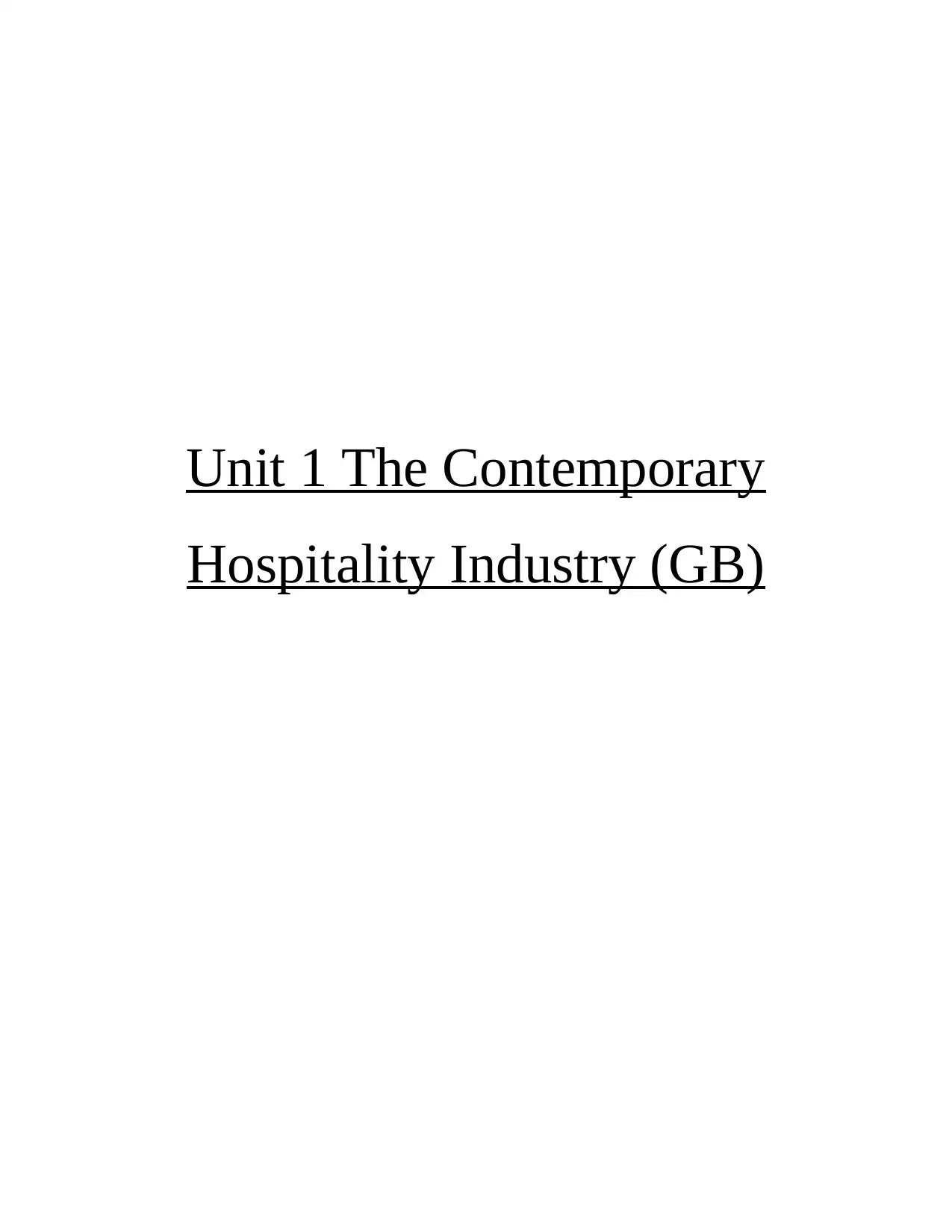
Unit 1 The Contemporary
Hospitality Industry (GB)
Hospitality Industry (GB)
Secure Best Marks with AI Grader
Need help grading? Try our AI Grader for instant feedback on your assignments.
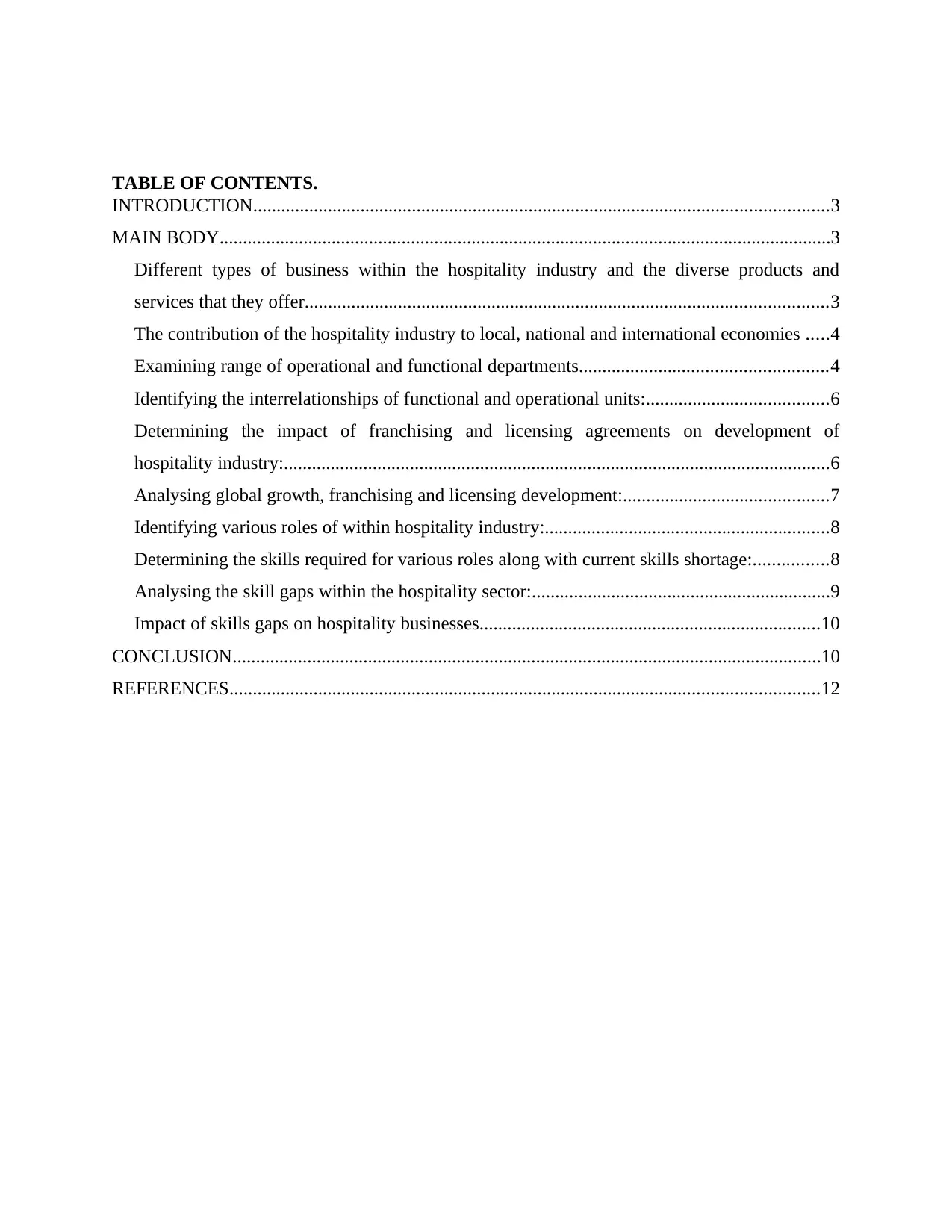
TABLE OF CONTENTS.
INTRODUCTION...........................................................................................................................3
MAIN BODY...................................................................................................................................3
Different types of business within the hospitality industry and the diverse products and
services that they offer................................................................................................................3
The contribution of the hospitality industry to local, national and international economies .....4
Examining range of operational and functional departments.....................................................4
Identifying the interrelationships of functional and operational units:.......................................6
Determining the impact of franchising and licensing agreements on development of
hospitality industry:.....................................................................................................................6
Analysing global growth, franchising and licensing development:............................................7
Identifying various roles of within hospitality industry:.............................................................8
Determining the skills required for various roles along with current skills shortage:................8
Analysing the skill gaps within the hospitality sector:................................................................9
Impact of skills gaps on hospitality businesses.........................................................................10
CONCLUSION..............................................................................................................................10
REFERENCES..............................................................................................................................12
INTRODUCTION...........................................................................................................................3
MAIN BODY...................................................................................................................................3
Different types of business within the hospitality industry and the diverse products and
services that they offer................................................................................................................3
The contribution of the hospitality industry to local, national and international economies .....4
Examining range of operational and functional departments.....................................................4
Identifying the interrelationships of functional and operational units:.......................................6
Determining the impact of franchising and licensing agreements on development of
hospitality industry:.....................................................................................................................6
Analysing global growth, franchising and licensing development:............................................7
Identifying various roles of within hospitality industry:.............................................................8
Determining the skills required for various roles along with current skills shortage:................8
Analysing the skill gaps within the hospitality sector:................................................................9
Impact of skills gaps on hospitality businesses.........................................................................10
CONCLUSION..............................................................................................................................10
REFERENCES..............................................................................................................................12
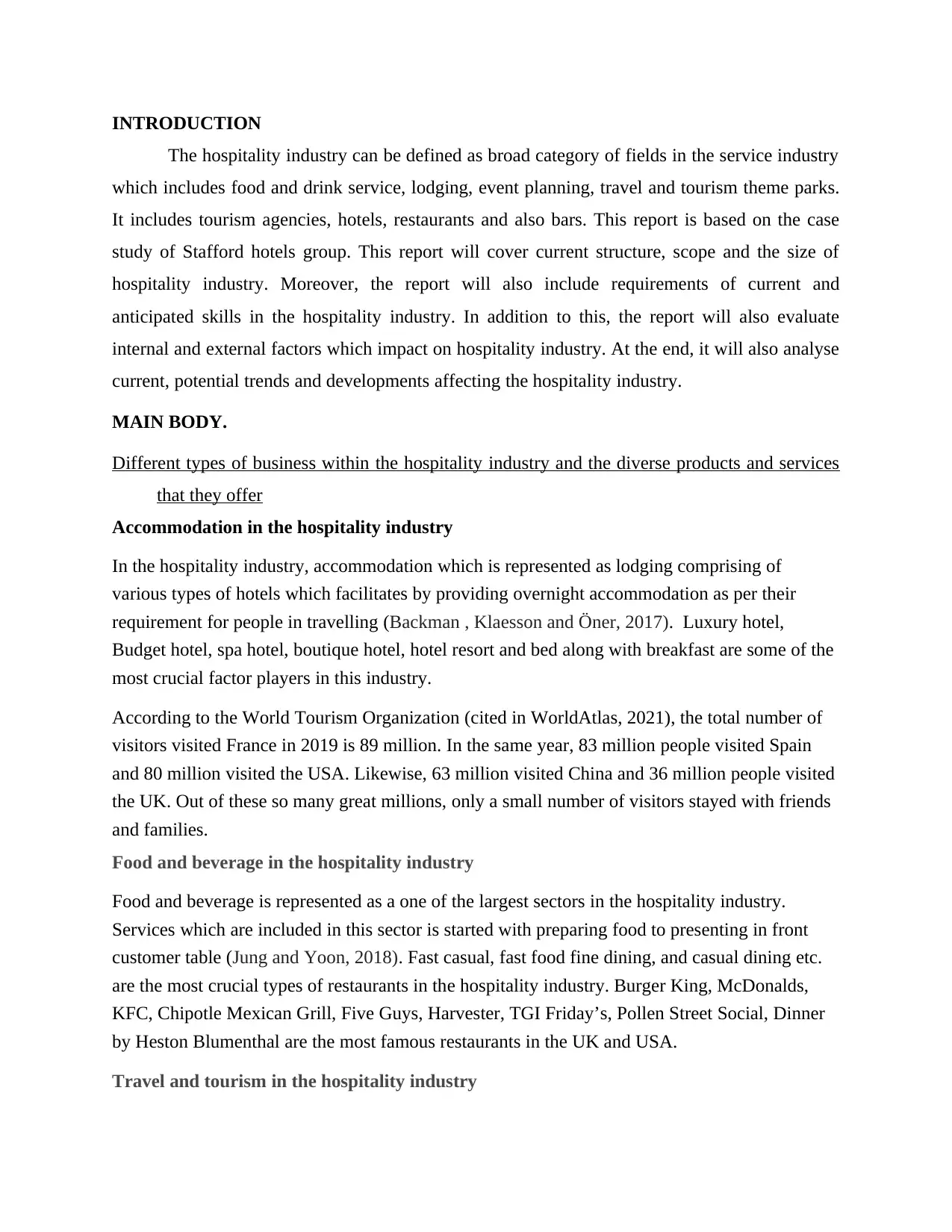
INTRODUCTION
The hospitality industry can be defined as broad category of fields in the service industry
which includes food and drink service, lodging, event planning, travel and tourism theme parks.
It includes tourism agencies, hotels, restaurants and also bars. This report is based on the case
study of Stafford hotels group. This report will cover current structure, scope and the size of
hospitality industry. Moreover, the report will also include requirements of current and
anticipated skills in the hospitality industry. In addition to this, the report will also evaluate
internal and external factors which impact on hospitality industry. At the end, it will also analyse
current, potential trends and developments affecting the hospitality industry.
MAIN BODY.
Different types of business within the hospitality industry and the diverse products and services
that they offer
Accommodation in the hospitality industry
In the hospitality industry, accommodation which is represented as lodging comprising of
various types of hotels which facilitates by providing overnight accommodation as per their
requirement for people in travelling (Backman , Klaesson and Öner, 2017). Luxury hotel,
Budget hotel, spa hotel, boutique hotel, hotel resort and bed along with breakfast are some of the
most crucial factor players in this industry.
According to the World Tourism Organization (cited in WorldAtlas, 2021), the total number of
visitors visited France in 2019 is 89 million. In the same year, 83 million people visited Spain
and 80 million visited the USA. Likewise, 63 million visited China and 36 million people visited
the UK. Out of these so many great millions, only a small number of visitors stayed with friends
and families.
Food and beverage in the hospitality industry
Food and beverage is represented as a one of the largest sectors in the hospitality industry.
Services which are included in this sector is started with preparing food to presenting in front
customer table (Jung and Yoon, 2018). Fast casual, fast food fine dining, and casual dining etc.
are the most crucial types of restaurants in the hospitality industry. Burger King, McDonalds,
KFC, Chipotle Mexican Grill, Five Guys, Harvester, TGI Friday’s, Pollen Street Social, Dinner
by Heston Blumenthal are the most famous restaurants in the UK and USA.
Travel and tourism in the hospitality industry
The hospitality industry can be defined as broad category of fields in the service industry
which includes food and drink service, lodging, event planning, travel and tourism theme parks.
It includes tourism agencies, hotels, restaurants and also bars. This report is based on the case
study of Stafford hotels group. This report will cover current structure, scope and the size of
hospitality industry. Moreover, the report will also include requirements of current and
anticipated skills in the hospitality industry. In addition to this, the report will also evaluate
internal and external factors which impact on hospitality industry. At the end, it will also analyse
current, potential trends and developments affecting the hospitality industry.
MAIN BODY.
Different types of business within the hospitality industry and the diverse products and services
that they offer
Accommodation in the hospitality industry
In the hospitality industry, accommodation which is represented as lodging comprising of
various types of hotels which facilitates by providing overnight accommodation as per their
requirement for people in travelling (Backman , Klaesson and Öner, 2017). Luxury hotel,
Budget hotel, spa hotel, boutique hotel, hotel resort and bed along with breakfast are some of the
most crucial factor players in this industry.
According to the World Tourism Organization (cited in WorldAtlas, 2021), the total number of
visitors visited France in 2019 is 89 million. In the same year, 83 million people visited Spain
and 80 million visited the USA. Likewise, 63 million visited China and 36 million people visited
the UK. Out of these so many great millions, only a small number of visitors stayed with friends
and families.
Food and beverage in the hospitality industry
Food and beverage is represented as a one of the largest sectors in the hospitality industry.
Services which are included in this sector is started with preparing food to presenting in front
customer table (Jung and Yoon, 2018). Fast casual, fast food fine dining, and casual dining etc.
are the most crucial types of restaurants in the hospitality industry. Burger King, McDonalds,
KFC, Chipotle Mexican Grill, Five Guys, Harvester, TGI Friday’s, Pollen Street Social, Dinner
by Heston Blumenthal are the most famous restaurants in the UK and USA.
Travel and tourism in the hospitality industry
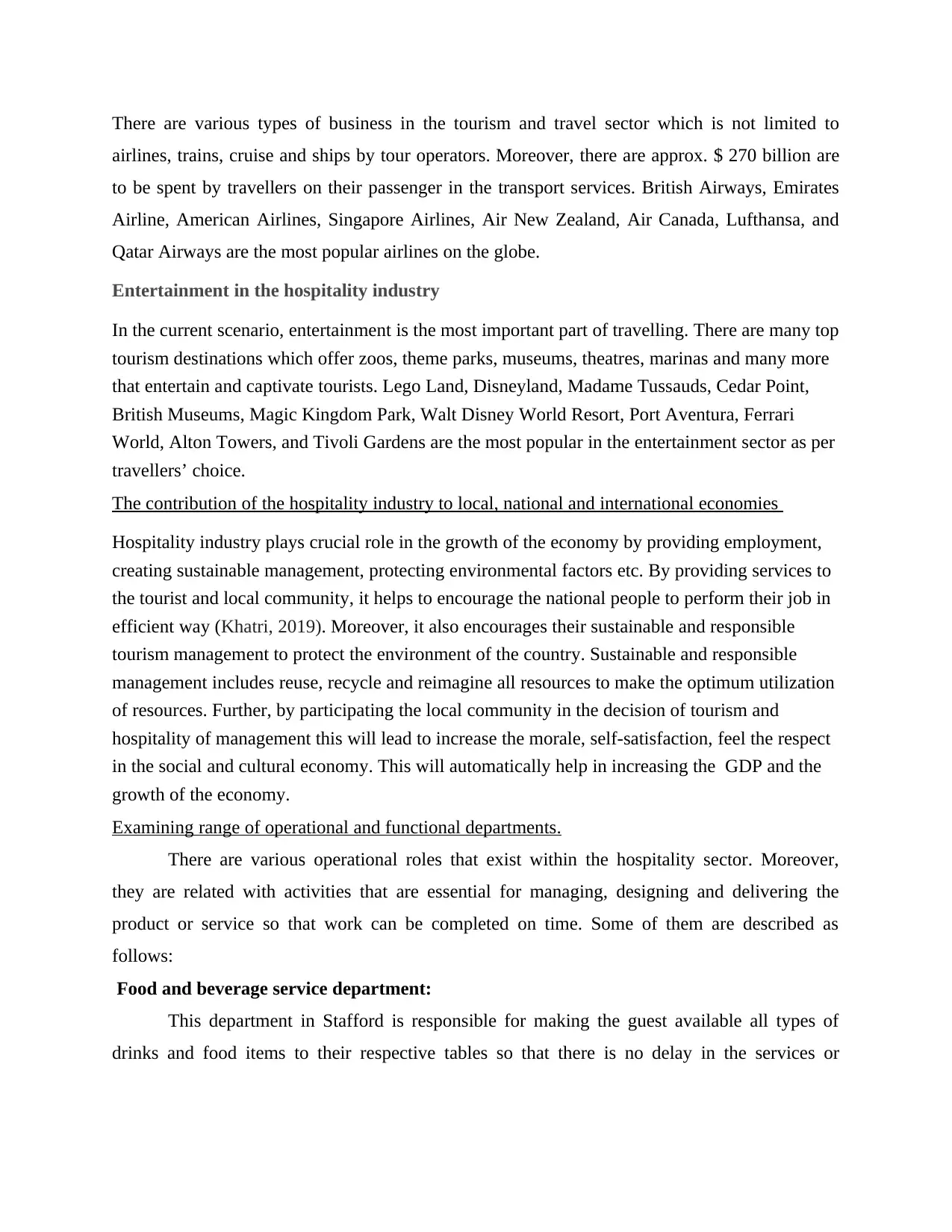
There are various types of business in the tourism and travel sector which is not limited to
airlines, trains, cruise and ships by tour operators. Moreover, there are approx. $ 270 billion are
to be spent by travellers on their passenger in the transport services. British Airways, Emirates
Airline, American Airlines, Singapore Airlines, Air New Zealand, Air Canada, Lufthansa, and
Qatar Airways are the most popular airlines on the globe.
Entertainment in the hospitality industry
In the current scenario, entertainment is the most important part of travelling. There are many top
tourism destinations which offer zoos, theme parks, museums, theatres, marinas and many more
that entertain and captivate tourists. Lego Land, Disneyland, Madame Tussauds, Cedar Point,
British Museums, Magic Kingdom Park, Walt Disney World Resort, Port Aventura, Ferrari
World, Alton Towers, and Tivoli Gardens are the most popular in the entertainment sector as per
travellers’ choice.
The contribution of the hospitality industry to local, national and international economies
Hospitality industry plays crucial role in the growth of the economy by providing employment,
creating sustainable management, protecting environmental factors etc. By providing services to
the tourist and local community, it helps to encourage the national people to perform their job in
efficient way (Khatri, 2019). Moreover, it also encourages their sustainable and responsible
tourism management to protect the environment of the country. Sustainable and responsible
management includes reuse, recycle and reimagine all resources to make the optimum utilization
of resources. Further, by participating the local community in the decision of tourism and
hospitality of management this will lead to increase the morale, self-satisfaction, feel the respect
in the social and cultural economy. This will automatically help in increasing the GDP and the
growth of the economy.
Examining range of operational and functional departments.
There are various operational roles that exist within the hospitality sector. Moreover,
they are related with activities that are essential for managing, designing and delivering the
product or service so that work can be completed on time. Some of them are described as
follows:
Food and beverage service department:
This department in Stafford is responsible for making the guest available all types of
drinks and food items to their respective tables so that there is no delay in the services or
airlines, trains, cruise and ships by tour operators. Moreover, there are approx. $ 270 billion are
to be spent by travellers on their passenger in the transport services. British Airways, Emirates
Airline, American Airlines, Singapore Airlines, Air New Zealand, Air Canada, Lufthansa, and
Qatar Airways are the most popular airlines on the globe.
Entertainment in the hospitality industry
In the current scenario, entertainment is the most important part of travelling. There are many top
tourism destinations which offer zoos, theme parks, museums, theatres, marinas and many more
that entertain and captivate tourists. Lego Land, Disneyland, Madame Tussauds, Cedar Point,
British Museums, Magic Kingdom Park, Walt Disney World Resort, Port Aventura, Ferrari
World, Alton Towers, and Tivoli Gardens are the most popular in the entertainment sector as per
travellers’ choice.
The contribution of the hospitality industry to local, national and international economies
Hospitality industry plays crucial role in the growth of the economy by providing employment,
creating sustainable management, protecting environmental factors etc. By providing services to
the tourist and local community, it helps to encourage the national people to perform their job in
efficient way (Khatri, 2019). Moreover, it also encourages their sustainable and responsible
tourism management to protect the environment of the country. Sustainable and responsible
management includes reuse, recycle and reimagine all resources to make the optimum utilization
of resources. Further, by participating the local community in the decision of tourism and
hospitality of management this will lead to increase the morale, self-satisfaction, feel the respect
in the social and cultural economy. This will automatically help in increasing the GDP and the
growth of the economy.
Examining range of operational and functional departments.
There are various operational roles that exist within the hospitality sector. Moreover,
they are related with activities that are essential for managing, designing and delivering the
product or service so that work can be completed on time. Some of them are described as
follows:
Food and beverage service department:
This department in Stafford is responsible for making the guest available all types of
drinks and food items to their respective tables so that there is no delay in the services or
Secure Best Marks with AI Grader
Need help grading? Try our AI Grader for instant feedback on your assignments.
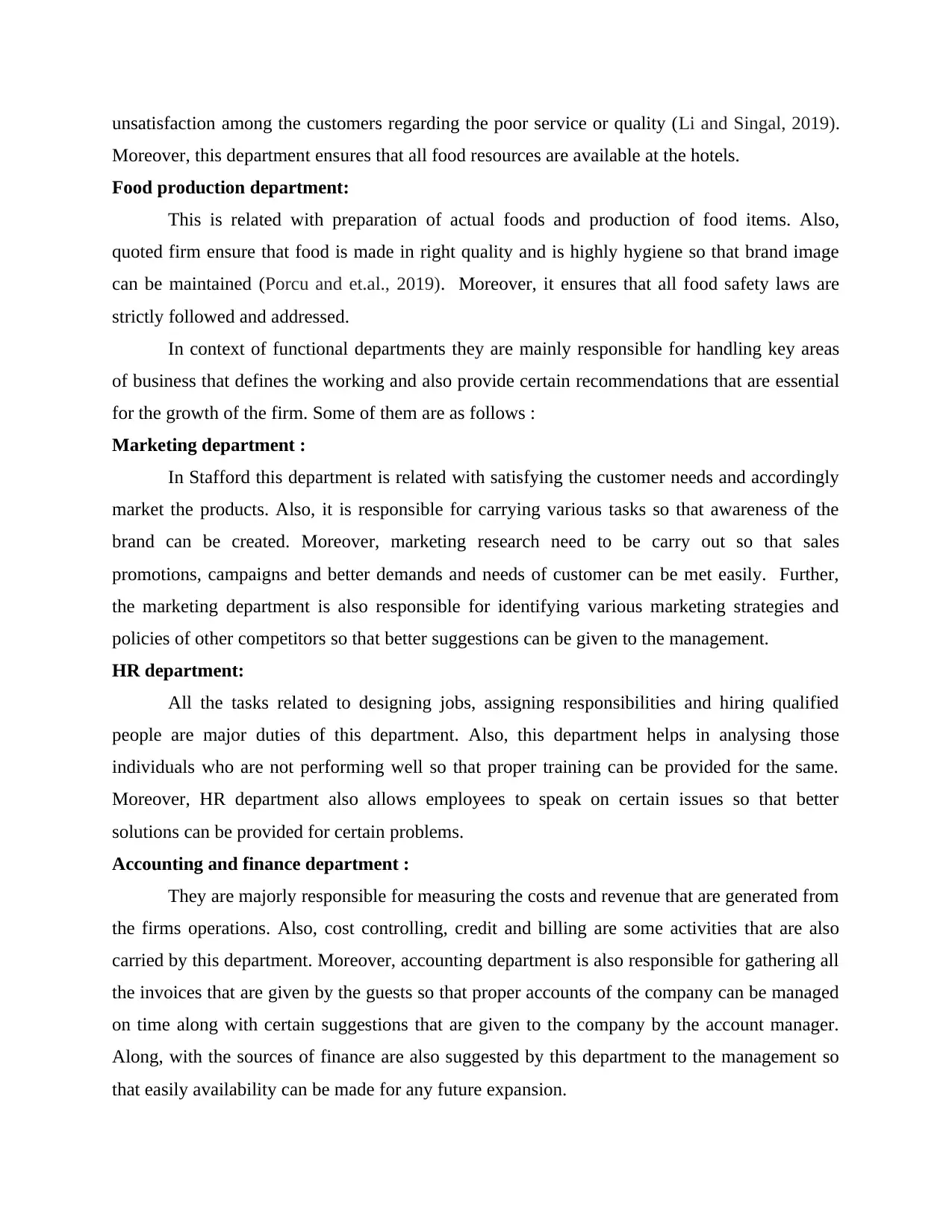
unsatisfaction among the customers regarding the poor service or quality (Li and Singal, 2019).
Moreover, this department ensures that all food resources are available at the hotels.
Food production department:
This is related with preparation of actual foods and production of food items. Also,
quoted firm ensure that food is made in right quality and is highly hygiene so that brand image
can be maintained (Porcu and et.al., 2019). Moreover, it ensures that all food safety laws are
strictly followed and addressed.
In context of functional departments they are mainly responsible for handling key areas
of business that defines the working and also provide certain recommendations that are essential
for the growth of the firm. Some of them are as follows :
Marketing department :
In Stafford this department is related with satisfying the customer needs and accordingly
market the products. Also, it is responsible for carrying various tasks so that awareness of the
brand can be created. Moreover, marketing research need to be carry out so that sales
promotions, campaigns and better demands and needs of customer can be met easily. Further,
the marketing department is also responsible for identifying various marketing strategies and
policies of other competitors so that better suggestions can be given to the management.
HR department:
All the tasks related to designing jobs, assigning responsibilities and hiring qualified
people are major duties of this department. Also, this department helps in analysing those
individuals who are not performing well so that proper training can be provided for the same.
Moreover, HR department also allows employees to speak on certain issues so that better
solutions can be provided for certain problems.
Accounting and finance department :
They are majorly responsible for measuring the costs and revenue that are generated from
the firms operations. Also, cost controlling, credit and billing are some activities that are also
carried by this department. Moreover, accounting department is also responsible for gathering all
the invoices that are given by the guests so that proper accounts of the company can be managed
on time along with certain suggestions that are given to the company by the account manager.
Along, with the sources of finance are also suggested by this department to the management so
that easily availability can be made for any future expansion.
Moreover, this department ensures that all food resources are available at the hotels.
Food production department:
This is related with preparation of actual foods and production of food items. Also,
quoted firm ensure that food is made in right quality and is highly hygiene so that brand image
can be maintained (Porcu and et.al., 2019). Moreover, it ensures that all food safety laws are
strictly followed and addressed.
In context of functional departments they are mainly responsible for handling key areas
of business that defines the working and also provide certain recommendations that are essential
for the growth of the firm. Some of them are as follows :
Marketing department :
In Stafford this department is related with satisfying the customer needs and accordingly
market the products. Also, it is responsible for carrying various tasks so that awareness of the
brand can be created. Moreover, marketing research need to be carry out so that sales
promotions, campaigns and better demands and needs of customer can be met easily. Further,
the marketing department is also responsible for identifying various marketing strategies and
policies of other competitors so that better suggestions can be given to the management.
HR department:
All the tasks related to designing jobs, assigning responsibilities and hiring qualified
people are major duties of this department. Also, this department helps in analysing those
individuals who are not performing well so that proper training can be provided for the same.
Moreover, HR department also allows employees to speak on certain issues so that better
solutions can be provided for certain problems.
Accounting and finance department :
They are majorly responsible for measuring the costs and revenue that are generated from
the firms operations. Also, cost controlling, credit and billing are some activities that are also
carried by this department. Moreover, accounting department is also responsible for gathering all
the invoices that are given by the guests so that proper accounts of the company can be managed
on time along with certain suggestions that are given to the company by the account manager.
Along, with the sources of finance are also suggested by this department to the management so
that easily availability can be made for any future expansion.
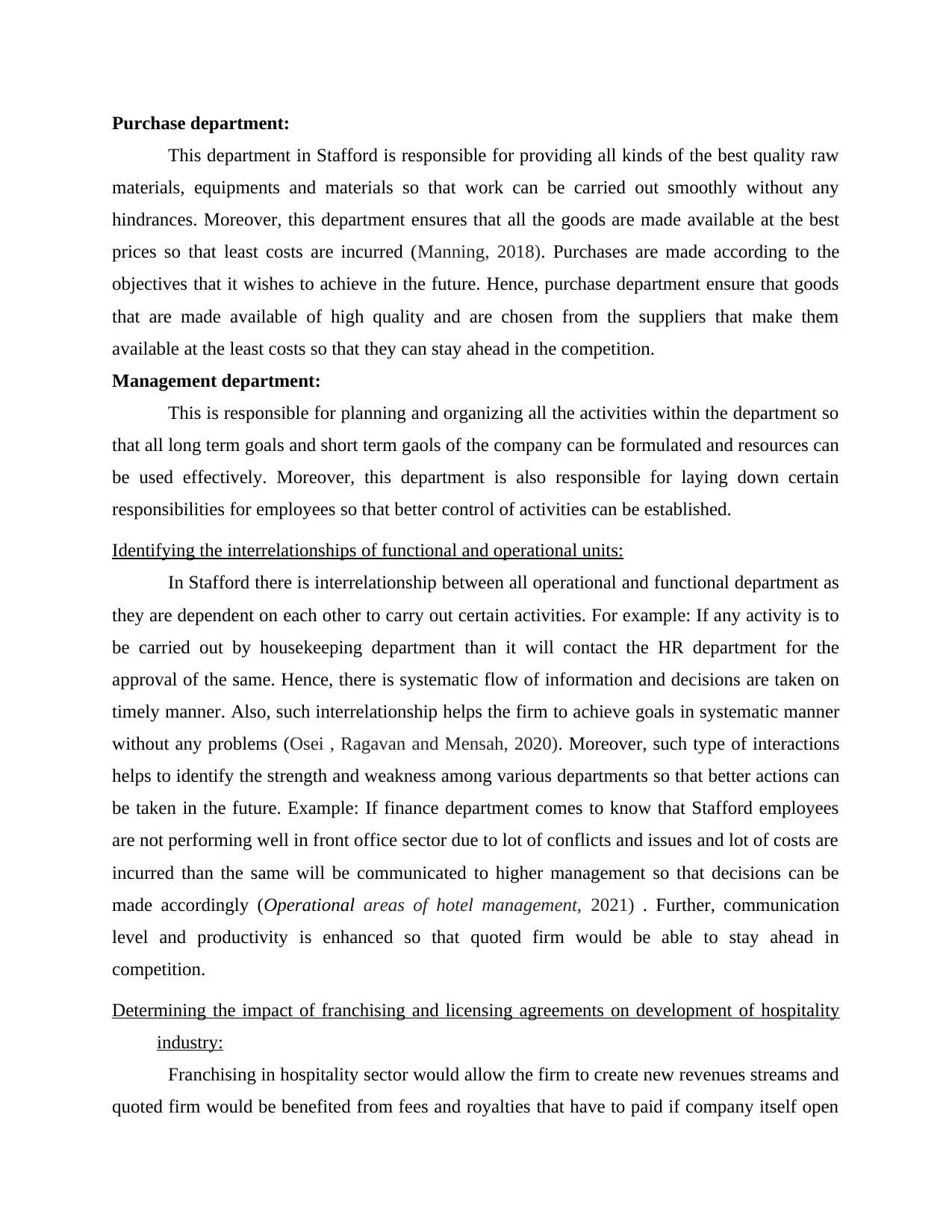
Purchase department:
This department in Stafford is responsible for providing all kinds of the best quality raw
materials, equipments and materials so that work can be carried out smoothly without any
hindrances. Moreover, this department ensures that all the goods are made available at the best
prices so that least costs are incurred (Manning, 2018). Purchases are made according to the
objectives that it wishes to achieve in the future. Hence, purchase department ensure that goods
that are made available of high quality and are chosen from the suppliers that make them
available at the least costs so that they can stay ahead in the competition.
Management department:
This is responsible for planning and organizing all the activities within the department so
that all long term goals and short term gaols of the company can be formulated and resources can
be used effectively. Moreover, this department is also responsible for laying down certain
responsibilities for employees so that better control of activities can be established.
Identifying the interrelationships of functional and operational units:
In Stafford there is interrelationship between all operational and functional department as
they are dependent on each other to carry out certain activities. For example: If any activity is to
be carried out by housekeeping department than it will contact the HR department for the
approval of the same. Hence, there is systematic flow of information and decisions are taken on
timely manner. Also, such interrelationship helps the firm to achieve goals in systematic manner
without any problems (Osei , Ragavan and Mensah, 2020). Moreover, such type of interactions
helps to identify the strength and weakness among various departments so that better actions can
be taken in the future. Example: If finance department comes to know that Stafford employees
are not performing well in front office sector due to lot of conflicts and issues and lot of costs are
incurred than the same will be communicated to higher management so that decisions can be
made accordingly (Operational areas of hotel management, 2021) . Further, communication
level and productivity is enhanced so that quoted firm would be able to stay ahead in
competition.
Determining the impact of franchising and licensing agreements on development of hospitality
industry:
Franchising in hospitality sector would allow the firm to create new revenues streams and
quoted firm would be benefited from fees and royalties that have to paid if company itself open
This department in Stafford is responsible for providing all kinds of the best quality raw
materials, equipments and materials so that work can be carried out smoothly without any
hindrances. Moreover, this department ensures that all the goods are made available at the best
prices so that least costs are incurred (Manning, 2018). Purchases are made according to the
objectives that it wishes to achieve in the future. Hence, purchase department ensure that goods
that are made available of high quality and are chosen from the suppliers that make them
available at the least costs so that they can stay ahead in the competition.
Management department:
This is responsible for planning and organizing all the activities within the department so
that all long term goals and short term gaols of the company can be formulated and resources can
be used effectively. Moreover, this department is also responsible for laying down certain
responsibilities for employees so that better control of activities can be established.
Identifying the interrelationships of functional and operational units:
In Stafford there is interrelationship between all operational and functional department as
they are dependent on each other to carry out certain activities. For example: If any activity is to
be carried out by housekeeping department than it will contact the HR department for the
approval of the same. Hence, there is systematic flow of information and decisions are taken on
timely manner. Also, such interrelationship helps the firm to achieve goals in systematic manner
without any problems (Osei , Ragavan and Mensah, 2020). Moreover, such type of interactions
helps to identify the strength and weakness among various departments so that better actions can
be taken in the future. Example: If finance department comes to know that Stafford employees
are not performing well in front office sector due to lot of conflicts and issues and lot of costs are
incurred than the same will be communicated to higher management so that decisions can be
made accordingly (Operational areas of hotel management, 2021) . Further, communication
level and productivity is enhanced so that quoted firm would be able to stay ahead in
competition.
Determining the impact of franchising and licensing agreements on development of hospitality
industry:
Franchising in hospitality sector would allow the firm to create new revenues streams and
quoted firm would be benefited from fees and royalties that have to paid if company itself open
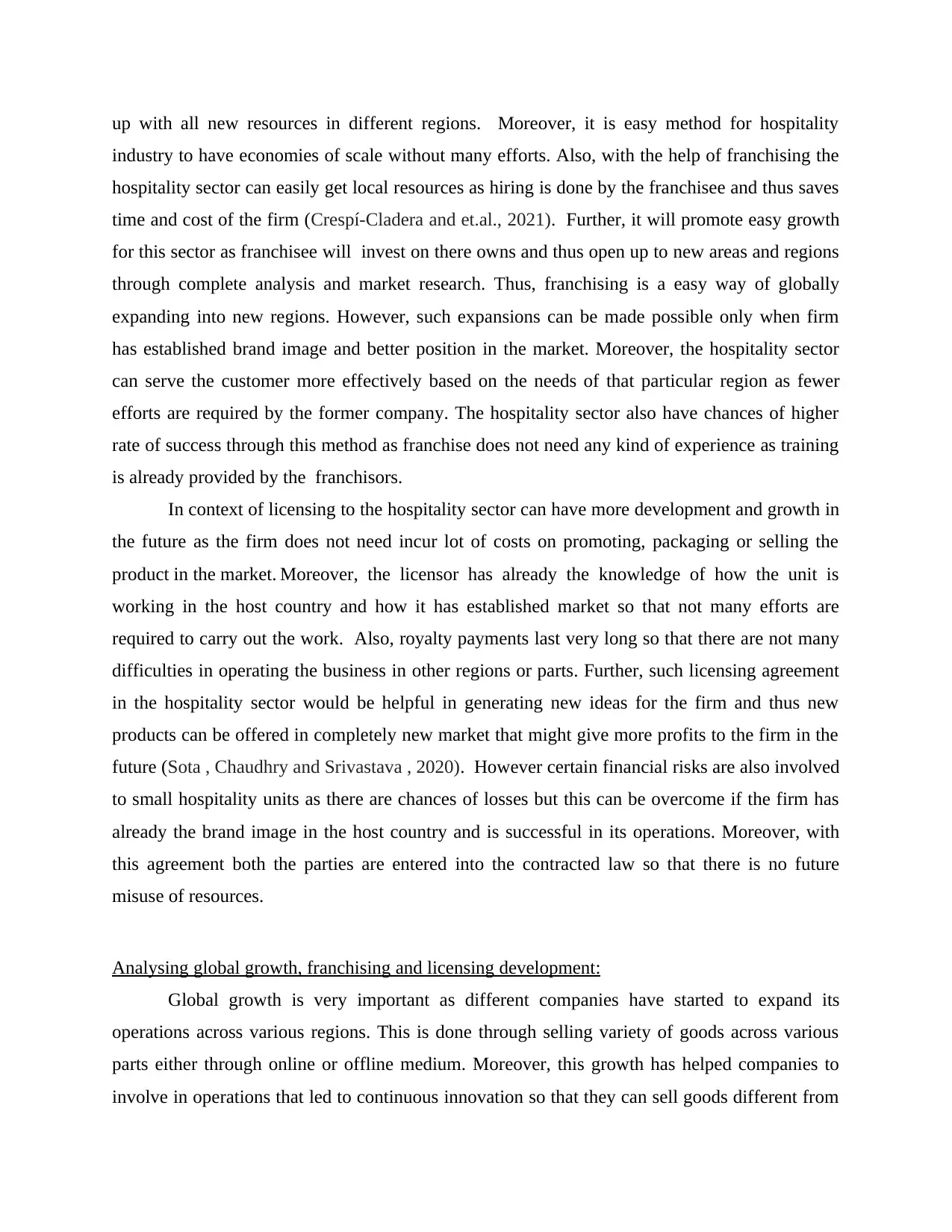
up with all new resources in different regions. Moreover, it is easy method for hospitality
industry to have economies of scale without many efforts. Also, with the help of franchising the
hospitality sector can easily get local resources as hiring is done by the franchisee and thus saves
time and cost of the firm (Crespí-Cladera and et.al., 2021). Further, it will promote easy growth
for this sector as franchisee will invest on there owns and thus open up to new areas and regions
through complete analysis and market research. Thus, franchising is a easy way of globally
expanding into new regions. However, such expansions can be made possible only when firm
has established brand image and better position in the market. Moreover, the hospitality sector
can serve the customer more effectively based on the needs of that particular region as fewer
efforts are required by the former company. The hospitality sector also have chances of higher
rate of success through this method as franchise does not need any kind of experience as training
is already provided by the franchisors.
In context of licensing to the hospitality sector can have more development and growth in
the future as the firm does not need incur lot of costs on promoting, packaging or selling the
product in the market. Moreover, the licensor has already the knowledge of how the unit is
working in the host country and how it has established market so that not many efforts are
required to carry out the work. Also, royalty payments last very long so that there are not many
difficulties in operating the business in other regions or parts. Further, such licensing agreement
in the hospitality sector would be helpful in generating new ideas for the firm and thus new
products can be offered in completely new market that might give more profits to the firm in the
future (Sota , Chaudhry and Srivastava , 2020). However certain financial risks are also involved
to small hospitality units as there are chances of losses but this can be overcome if the firm has
already the brand image in the host country and is successful in its operations. Moreover, with
this agreement both the parties are entered into the contracted law so that there is no future
misuse of resources.
Analysing global growth, franchising and licensing development:
Global growth is very important as different companies have started to expand its
operations across various regions. This is done through selling variety of goods across various
parts either through online or offline medium. Moreover, this growth has helped companies to
involve in operations that led to continuous innovation so that they can sell goods different from
industry to have economies of scale without many efforts. Also, with the help of franchising the
hospitality sector can easily get local resources as hiring is done by the franchisee and thus saves
time and cost of the firm (Crespí-Cladera and et.al., 2021). Further, it will promote easy growth
for this sector as franchisee will invest on there owns and thus open up to new areas and regions
through complete analysis and market research. Thus, franchising is a easy way of globally
expanding into new regions. However, such expansions can be made possible only when firm
has established brand image and better position in the market. Moreover, the hospitality sector
can serve the customer more effectively based on the needs of that particular region as fewer
efforts are required by the former company. The hospitality sector also have chances of higher
rate of success through this method as franchise does not need any kind of experience as training
is already provided by the franchisors.
In context of licensing to the hospitality sector can have more development and growth in
the future as the firm does not need incur lot of costs on promoting, packaging or selling the
product in the market. Moreover, the licensor has already the knowledge of how the unit is
working in the host country and how it has established market so that not many efforts are
required to carry out the work. Also, royalty payments last very long so that there are not many
difficulties in operating the business in other regions or parts. Further, such licensing agreement
in the hospitality sector would be helpful in generating new ideas for the firm and thus new
products can be offered in completely new market that might give more profits to the firm in the
future (Sota , Chaudhry and Srivastava , 2020). However certain financial risks are also involved
to small hospitality units as there are chances of losses but this can be overcome if the firm has
already the brand image in the host country and is successful in its operations. Moreover, with
this agreement both the parties are entered into the contracted law so that there is no future
misuse of resources.
Analysing global growth, franchising and licensing development:
Global growth is very important as different companies have started to expand its
operations across various regions. This is done through selling variety of goods across various
parts either through online or offline medium. Moreover, this growth has helped companies to
involve in operations that led to continuous innovation so that they can sell goods different from
Paraphrase This Document
Need a fresh take? Get an instant paraphrase of this document with our AI Paraphraser
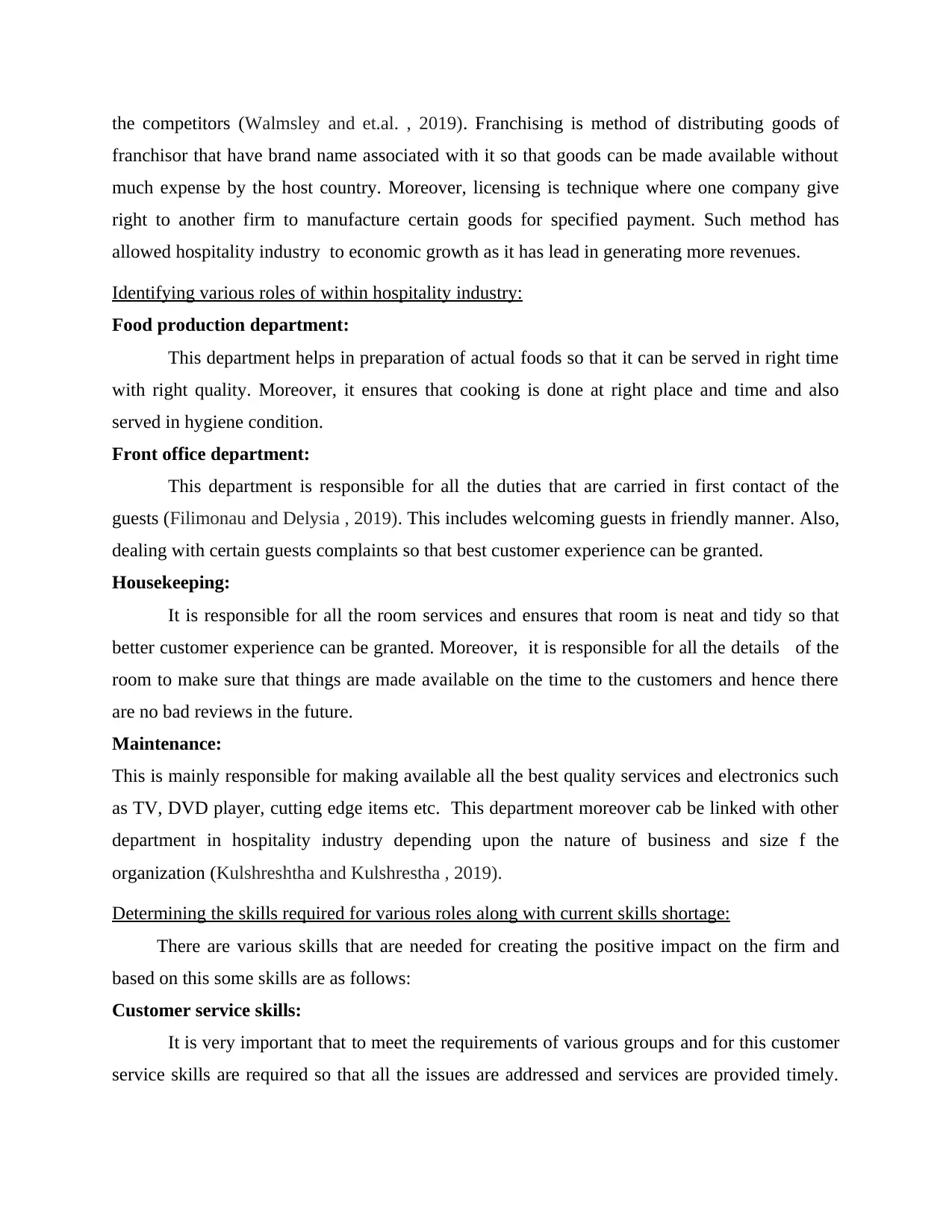
the competitors (Walmsley and et.al. , 2019). Franchising is method of distributing goods of
franchisor that have brand name associated with it so that goods can be made available without
much expense by the host country. Moreover, licensing is technique where one company give
right to another firm to manufacture certain goods for specified payment. Such method has
allowed hospitality industry to economic growth as it has lead in generating more revenues.
Identifying various roles of within hospitality industry:
Food production department:
This department helps in preparation of actual foods so that it can be served in right time
with right quality. Moreover, it ensures that cooking is done at right place and time and also
served in hygiene condition.
Front office department:
This department is responsible for all the duties that are carried in first contact of the
guests (Filimonau and Delysia , 2019). This includes welcoming guests in friendly manner. Also,
dealing with certain guests complaints so that best customer experience can be granted.
Housekeeping:
It is responsible for all the room services and ensures that room is neat and tidy so that
better customer experience can be granted. Moreover, it is responsible for all the details of the
room to make sure that things are made available on the time to the customers and hence there
are no bad reviews in the future.
Maintenance:
This is mainly responsible for making available all the best quality services and electronics such
as TV, DVD player, cutting edge items etc. This department moreover cab be linked with other
department in hospitality industry depending upon the nature of business and size f the
organization (Kulshreshtha and Kulshrestha , 2019).
Determining the skills required for various roles along with current skills shortage:
There are various skills that are needed for creating the positive impact on the firm and
based on this some skills are as follows:
Customer service skills:
It is very important that to meet the requirements of various groups and for this customer
service skills are required so that all the issues are addressed and services are provided timely.
franchisor that have brand name associated with it so that goods can be made available without
much expense by the host country. Moreover, licensing is technique where one company give
right to another firm to manufacture certain goods for specified payment. Such method has
allowed hospitality industry to economic growth as it has lead in generating more revenues.
Identifying various roles of within hospitality industry:
Food production department:
This department helps in preparation of actual foods so that it can be served in right time
with right quality. Moreover, it ensures that cooking is done at right place and time and also
served in hygiene condition.
Front office department:
This department is responsible for all the duties that are carried in first contact of the
guests (Filimonau and Delysia , 2019). This includes welcoming guests in friendly manner. Also,
dealing with certain guests complaints so that best customer experience can be granted.
Housekeeping:
It is responsible for all the room services and ensures that room is neat and tidy so that
better customer experience can be granted. Moreover, it is responsible for all the details of the
room to make sure that things are made available on the time to the customers and hence there
are no bad reviews in the future.
Maintenance:
This is mainly responsible for making available all the best quality services and electronics such
as TV, DVD player, cutting edge items etc. This department moreover cab be linked with other
department in hospitality industry depending upon the nature of business and size f the
organization (Kulshreshtha and Kulshrestha , 2019).
Determining the skills required for various roles along with current skills shortage:
There are various skills that are needed for creating the positive impact on the firm and
based on this some skills are as follows:
Customer service skills:
It is very important that to meet the requirements of various groups and for this customer
service skills are required so that all the issues are addressed and services are provided timely.
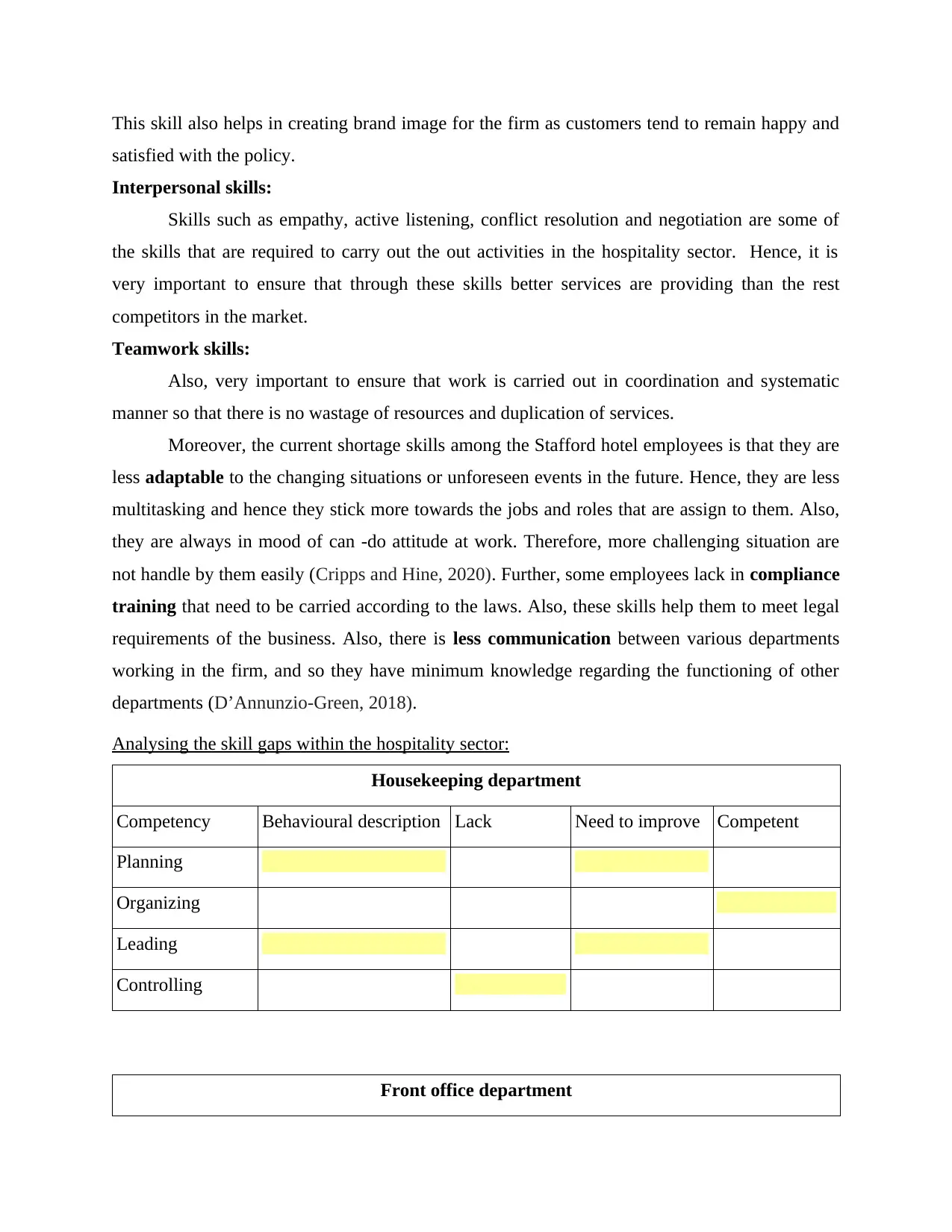
This skill also helps in creating brand image for the firm as customers tend to remain happy and
satisfied with the policy.
Interpersonal skills:
Skills such as empathy, active listening, conflict resolution and negotiation are some of
the skills that are required to carry out the out activities in the hospitality sector. Hence, it is
very important to ensure that through these skills better services are providing than the rest
competitors in the market.
Teamwork skills:
Also, very important to ensure that work is carried out in coordination and systematic
manner so that there is no wastage of resources and duplication of services.
Moreover, the current shortage skills among the Stafford hotel employees is that they are
less adaptable to the changing situations or unforeseen events in the future. Hence, they are less
multitasking and hence they stick more towards the jobs and roles that are assign to them. Also,
they are always in mood of can -do attitude at work. Therefore, more challenging situation are
not handle by them easily (Cripps and Hine, 2020). Further, some employees lack in compliance
training that need to be carried according to the laws. Also, these skills help them to meet legal
requirements of the business. Also, there is less communication between various departments
working in the firm, and so they have minimum knowledge regarding the functioning of other
departments (D’Annunzio-Green, 2018).
Analysing the skill gaps within the hospitality sector:
Housekeeping department
Competency Behavioural description Lack Need to improve Competent
Planning
Organizing
Leading
Controlling
Front office department
satisfied with the policy.
Interpersonal skills:
Skills such as empathy, active listening, conflict resolution and negotiation are some of
the skills that are required to carry out the out activities in the hospitality sector. Hence, it is
very important to ensure that through these skills better services are providing than the rest
competitors in the market.
Teamwork skills:
Also, very important to ensure that work is carried out in coordination and systematic
manner so that there is no wastage of resources and duplication of services.
Moreover, the current shortage skills among the Stafford hotel employees is that they are
less adaptable to the changing situations or unforeseen events in the future. Hence, they are less
multitasking and hence they stick more towards the jobs and roles that are assign to them. Also,
they are always in mood of can -do attitude at work. Therefore, more challenging situation are
not handle by them easily (Cripps and Hine, 2020). Further, some employees lack in compliance
training that need to be carried according to the laws. Also, these skills help them to meet legal
requirements of the business. Also, there is less communication between various departments
working in the firm, and so they have minimum knowledge regarding the functioning of other
departments (D’Annunzio-Green, 2018).
Analysing the skill gaps within the hospitality sector:
Housekeeping department
Competency Behavioural description Lack Need to improve Competent
Planning
Organizing
Leading
Controlling
Front office department
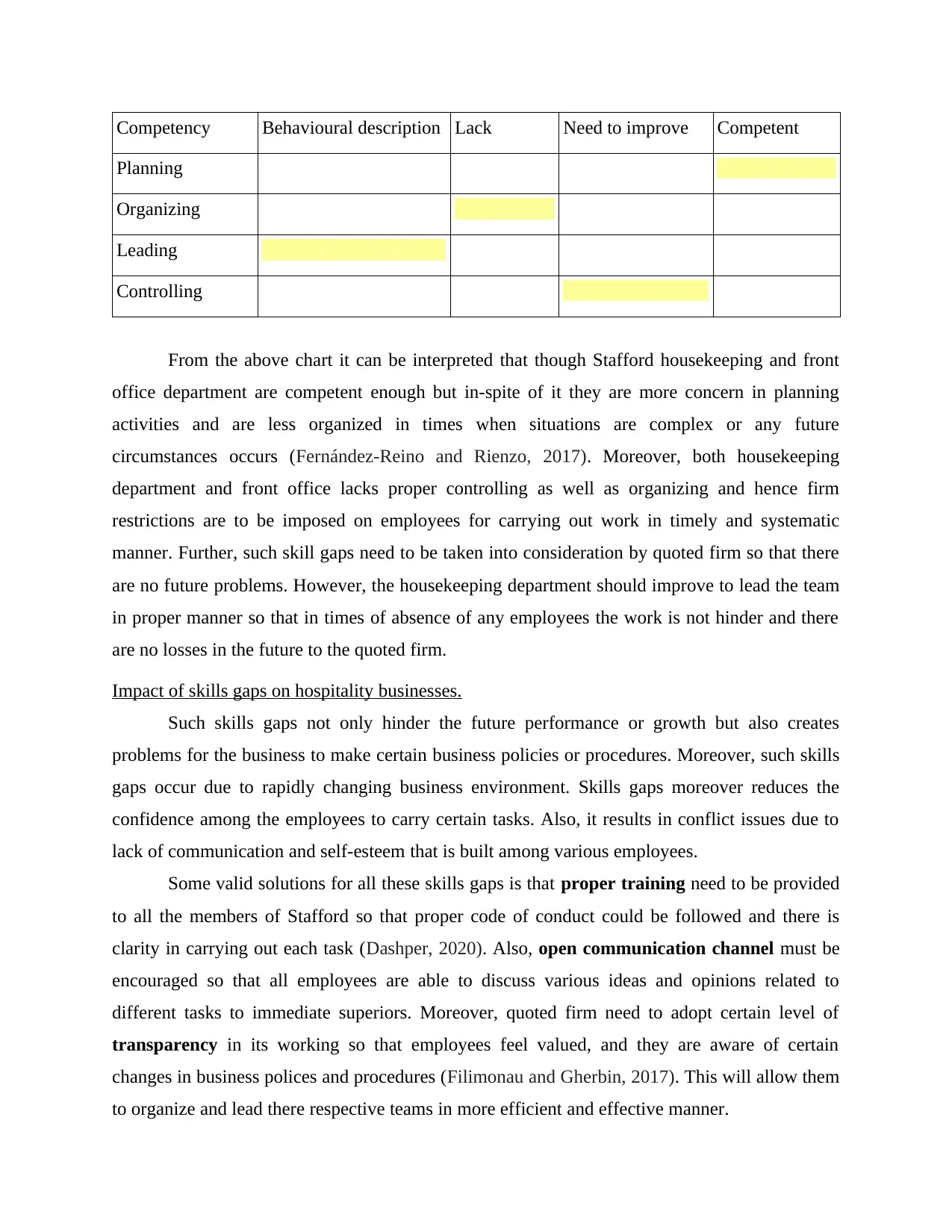
Competency Behavioural description Lack Need to improve Competent
Planning
Organizing
Leading
Controlling
From the above chart it can be interpreted that though Stafford housekeeping and front
office department are competent enough but in-spite of it they are more concern in planning
activities and are less organized in times when situations are complex or any future
circumstances occurs (Fernández-Reino and Rienzo, 2017). Moreover, both housekeeping
department and front office lacks proper controlling as well as organizing and hence firm
restrictions are to be imposed on employees for carrying out work in timely and systematic
manner. Further, such skill gaps need to be taken into consideration by quoted firm so that there
are no future problems. However, the housekeeping department should improve to lead the team
in proper manner so that in times of absence of any employees the work is not hinder and there
are no losses in the future to the quoted firm.
Impact of skills gaps on hospitality businesses.
Such skills gaps not only hinder the future performance or growth but also creates
problems for the business to make certain business policies or procedures. Moreover, such skills
gaps occur due to rapidly changing business environment. Skills gaps moreover reduces the
confidence among the employees to carry certain tasks. Also, it results in conflict issues due to
lack of communication and self-esteem that is built among various employees.
Some valid solutions for all these skills gaps is that proper training need to be provided
to all the members of Stafford so that proper code of conduct could be followed and there is
clarity in carrying out each task (Dashper, 2020). Also, open communication channel must be
encouraged so that all employees are able to discuss various ideas and opinions related to
different tasks to immediate superiors. Moreover, quoted firm need to adopt certain level of
transparency in its working so that employees feel valued, and they are aware of certain
changes in business polices and procedures (Filimonau and Gherbin, 2017). This will allow them
to organize and lead there respective teams in more efficient and effective manner.
Planning
Organizing
Leading
Controlling
From the above chart it can be interpreted that though Stafford housekeeping and front
office department are competent enough but in-spite of it they are more concern in planning
activities and are less organized in times when situations are complex or any future
circumstances occurs (Fernández-Reino and Rienzo, 2017). Moreover, both housekeeping
department and front office lacks proper controlling as well as organizing and hence firm
restrictions are to be imposed on employees for carrying out work in timely and systematic
manner. Further, such skill gaps need to be taken into consideration by quoted firm so that there
are no future problems. However, the housekeeping department should improve to lead the team
in proper manner so that in times of absence of any employees the work is not hinder and there
are no losses in the future to the quoted firm.
Impact of skills gaps on hospitality businesses.
Such skills gaps not only hinder the future performance or growth but also creates
problems for the business to make certain business policies or procedures. Moreover, such skills
gaps occur due to rapidly changing business environment. Skills gaps moreover reduces the
confidence among the employees to carry certain tasks. Also, it results in conflict issues due to
lack of communication and self-esteem that is built among various employees.
Some valid solutions for all these skills gaps is that proper training need to be provided
to all the members of Stafford so that proper code of conduct could be followed and there is
clarity in carrying out each task (Dashper, 2020). Also, open communication channel must be
encouraged so that all employees are able to discuss various ideas and opinions related to
different tasks to immediate superiors. Moreover, quoted firm need to adopt certain level of
transparency in its working so that employees feel valued, and they are aware of certain
changes in business polices and procedures (Filimonau and Gherbin, 2017). This will allow them
to organize and lead there respective teams in more efficient and effective manner.
Secure Best Marks with AI Grader
Need help grading? Try our AI Grader for instant feedback on your assignments.
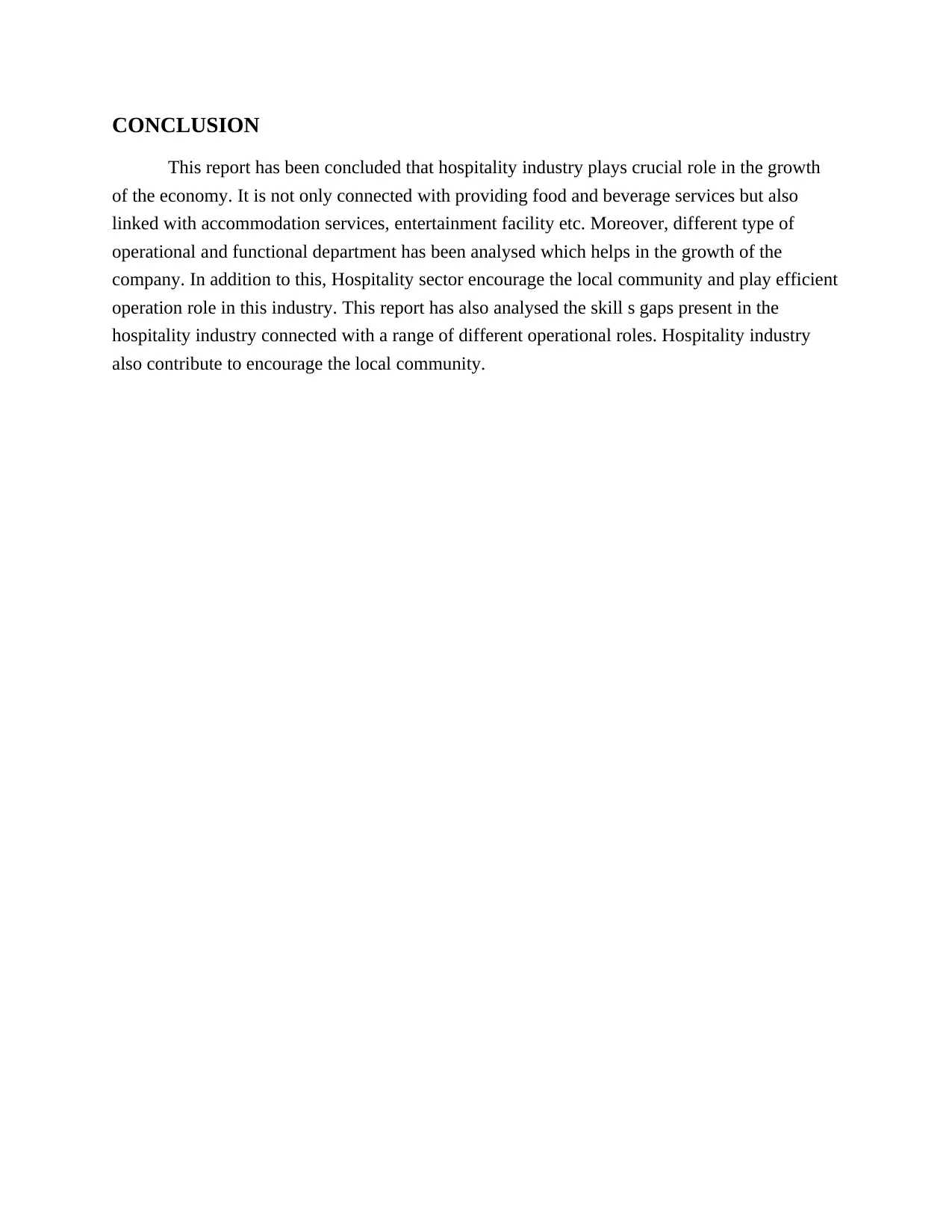
CONCLUSION
This report has been concluded that hospitality industry plays crucial role in the growth
of the economy. It is not only connected with providing food and beverage services but also
linked with accommodation services, entertainment facility etc. Moreover, different type of
operational and functional department has been analysed which helps in the growth of the
company. In addition to this, Hospitality sector encourage the local community and play efficient
operation role in this industry. This report has also analysed the skill s gaps present in the
hospitality industry connected with a range of different operational roles. Hospitality industry
also contribute to encourage the local community.
This report has been concluded that hospitality industry plays crucial role in the growth
of the economy. It is not only connected with providing food and beverage services but also
linked with accommodation services, entertainment facility etc. Moreover, different type of
operational and functional department has been analysed which helps in the growth of the
company. In addition to this, Hospitality sector encourage the local community and play efficient
operation role in this industry. This report has also analysed the skill s gaps present in the
hospitality industry connected with a range of different operational roles. Hospitality industry
also contribute to encourage the local community.
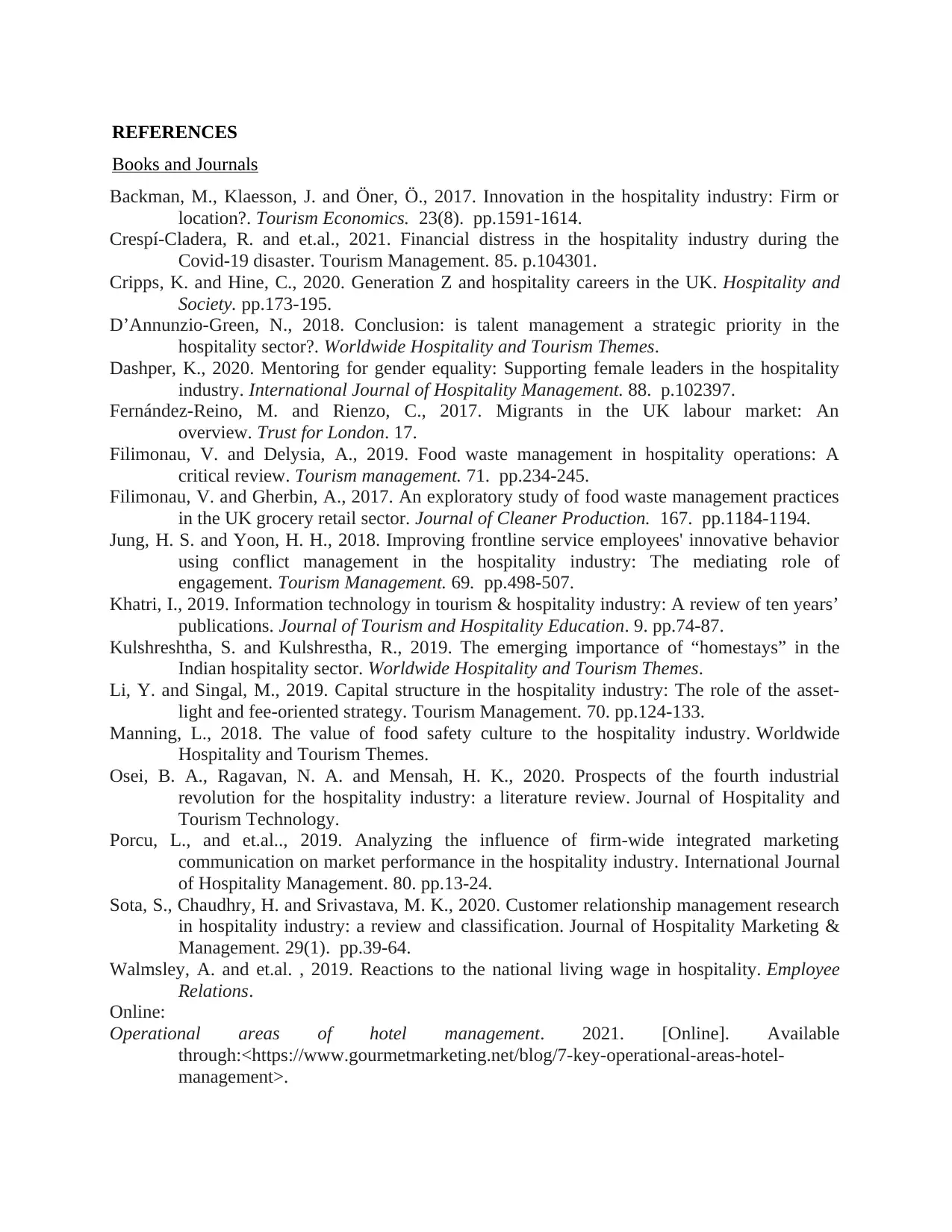
REFERENCES
Books and Journals
Backman, M., Klaesson, J. and Öner, Ö., 2017. Innovation in the hospitality industry: Firm or
location?. Tourism Economics. 23(8). pp.1591-1614.
Crespí-Cladera, R. and et.al., 2021. Financial distress in the hospitality industry during the
Covid-19 disaster. Tourism Management. 85. p.104301.
Cripps, K. and Hine, C., 2020. Generation Z and hospitality careers in the UK. Hospitality and
Society. pp.173-195.
D’Annunzio-Green, N., 2018. Conclusion: is talent management a strategic priority in the
hospitality sector?. Worldwide Hospitality and Tourism Themes.
Dashper, K., 2020. Mentoring for gender equality: Supporting female leaders in the hospitality
industry. International Journal of Hospitality Management. 88. p.102397.
Fernández-Reino, M. and Rienzo, C., 2017. Migrants in the UK labour market: An
overview. Trust for London. 17.
Filimonau, V. and Delysia, A., 2019. Food waste management in hospitality operations: A
critical review. Tourism management. 71. pp.234-245.
Filimonau, V. and Gherbin, A., 2017. An exploratory study of food waste management practices
in the UK grocery retail sector. Journal of Cleaner Production. 167. pp.1184-1194.
Jung, H. S. and Yoon, H. H., 2018. Improving frontline service employees' innovative behavior
using conflict management in the hospitality industry: The mediating role of
engagement. Tourism Management. 69. pp.498-507.
Khatri, I., 2019. Information technology in tourism & hospitality industry: A review of ten years’
publications. Journal of Tourism and Hospitality Education. 9. pp.74-87.
Kulshreshtha, S. and Kulshrestha, R., 2019. The emerging importance of “homestays” in the
Indian hospitality sector. Worldwide Hospitality and Tourism Themes.
Li, Y. and Singal, M., 2019. Capital structure in the hospitality industry: The role of the asset-
light and fee-oriented strategy. Tourism Management. 70. pp.124-133.
Manning, L., 2018. The value of food safety culture to the hospitality industry. Worldwide
Hospitality and Tourism Themes.
Osei, B. A., Ragavan, N. A. and Mensah, H. K., 2020. Prospects of the fourth industrial
revolution for the hospitality industry: a literature review. Journal of Hospitality and
Tourism Technology.
Porcu, L., and et.al.., 2019. Analyzing the influence of firm-wide integrated marketing
communication on market performance in the hospitality industry. International Journal
of Hospitality Management. 80. pp.13-24.
Sota, S., Chaudhry, H. and Srivastava, M. K., 2020. Customer relationship management research
in hospitality industry: a review and classification. Journal of Hospitality Marketing &
Management. 29(1). pp.39-64.
Walmsley, A. and et.al. , 2019. Reactions to the national living wage in hospitality. Employee
Relations.
Online:
Operational areas of hotel management. 2021. [Online]. Available
through:<https://www.gourmetmarketing.net/blog/7-key-operational-areas-hotel-
management>.
Books and Journals
Backman, M., Klaesson, J. and Öner, Ö., 2017. Innovation in the hospitality industry: Firm or
location?. Tourism Economics. 23(8). pp.1591-1614.
Crespí-Cladera, R. and et.al., 2021. Financial distress in the hospitality industry during the
Covid-19 disaster. Tourism Management. 85. p.104301.
Cripps, K. and Hine, C., 2020. Generation Z and hospitality careers in the UK. Hospitality and
Society. pp.173-195.
D’Annunzio-Green, N., 2018. Conclusion: is talent management a strategic priority in the
hospitality sector?. Worldwide Hospitality and Tourism Themes.
Dashper, K., 2020. Mentoring for gender equality: Supporting female leaders in the hospitality
industry. International Journal of Hospitality Management. 88. p.102397.
Fernández-Reino, M. and Rienzo, C., 2017. Migrants in the UK labour market: An
overview. Trust for London. 17.
Filimonau, V. and Delysia, A., 2019. Food waste management in hospitality operations: A
critical review. Tourism management. 71. pp.234-245.
Filimonau, V. and Gherbin, A., 2017. An exploratory study of food waste management practices
in the UK grocery retail sector. Journal of Cleaner Production. 167. pp.1184-1194.
Jung, H. S. and Yoon, H. H., 2018. Improving frontline service employees' innovative behavior
using conflict management in the hospitality industry: The mediating role of
engagement. Tourism Management. 69. pp.498-507.
Khatri, I., 2019. Information technology in tourism & hospitality industry: A review of ten years’
publications. Journal of Tourism and Hospitality Education. 9. pp.74-87.
Kulshreshtha, S. and Kulshrestha, R., 2019. The emerging importance of “homestays” in the
Indian hospitality sector. Worldwide Hospitality and Tourism Themes.
Li, Y. and Singal, M., 2019. Capital structure in the hospitality industry: The role of the asset-
light and fee-oriented strategy. Tourism Management. 70. pp.124-133.
Manning, L., 2018. The value of food safety culture to the hospitality industry. Worldwide
Hospitality and Tourism Themes.
Osei, B. A., Ragavan, N. A. and Mensah, H. K., 2020. Prospects of the fourth industrial
revolution for the hospitality industry: a literature review. Journal of Hospitality and
Tourism Technology.
Porcu, L., and et.al.., 2019. Analyzing the influence of firm-wide integrated marketing
communication on market performance in the hospitality industry. International Journal
of Hospitality Management. 80. pp.13-24.
Sota, S., Chaudhry, H. and Srivastava, M. K., 2020. Customer relationship management research
in hospitality industry: a review and classification. Journal of Hospitality Marketing &
Management. 29(1). pp.39-64.
Walmsley, A. and et.al. , 2019. Reactions to the national living wage in hospitality. Employee
Relations.
Online:
Operational areas of hotel management. 2021. [Online]. Available
through:<https://www.gourmetmarketing.net/blog/7-key-operational-areas-hotel-
management>.
1 out of 12
Related Documents
Your All-in-One AI-Powered Toolkit for Academic Success.
+13062052269
info@desklib.com
Available 24*7 on WhatsApp / Email
![[object Object]](/_next/static/media/star-bottom.7253800d.svg)
Unlock your academic potential
© 2024 | Zucol Services PVT LTD | All rights reserved.



